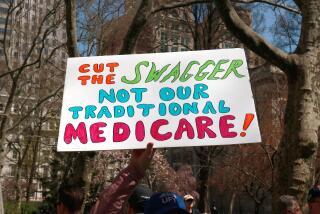Ends Don’t Justify the Means Test
The Senate vote last month to increase Medicare Part B premiums for high-income beneficiaries has been almost universally hailed as a politically courageous move to save Medicare from looming budgetary shortfalls. The celebrants are correct about one thing: Raising premiums steeply for the affluent elderly requires political courage. But they are wrong to think that this is the right policy for Medicare’s future.
In fact, the Senate’s Medicare provision transforms a reasonable sentiment--that social programs should be progressively financed--into a truly bad idea, one that not only fails to achieve its stated goals but also threatens the broad-based political support that sustains America’s largest and most successful public health insurance program.
To many within the Washington political community, charging higher premiums to upper-income elderly is simply common sense. The idea unites New Democrats who rail against “corporate welfare,” deficit hawks worried about the budget and Republicans who are usually staunch defenders of the well-to-do. Defying years of common usage, these actors have developed a new jargon in which “means testing” does not mean what ordinary language suggests: setting eligibility on the basis of financial need. Instead, it refers to scaling insurance premiums to income. With this novel semantic twist, “means-testing Medicare” connects the “undeserving poor” on welfare with the supposedly undeserving rich on Medicare.
This appeal to soak-the-rich populism is misplaced. More than three out of four Medicare beneficiaries have annual incomes below $25,000 and only 3% of Medicare spending goes to recipients with incomes above $50,000. The average senior citizen, despite Medicare’s protection, now spends roughly 21% of household income on medical care, up from 15% a decade ago. Even Medicare beneficiaries with incomes more than four times the poverty line spend 11% of their incomes on medical care. And as beneficiaries age, their medical costs rise while their incomes fall.
Medicare Part B--which covers physicians’ fees and other outpatient expenses--is paid for by both flat individual premiums and general tax revenues. While the premiums have received the most attention, the bulk of the financing actually comes from general revenues. These revenues are, of course, raised largely through a progressive tax on income. That means upper-income Medicare beneficiaries pay more than do poorer recipients, both during their working lives and in retirement. Hence Part B is already progressively financed.
Advocates of means testing, however, direct their attention (and ire) solely at the flat premium, which now pays for roughly a quarter of Medicare Part B’s total costs. The Senate legislation, for example, would have premiums increase on a sliding scale, beginning with single persons with incomes of more than $50,000 and couples with incomes higher than $75,000. Premiums would rise from the current $44 per month to a maximum of roughly $180 per month. (In the case of couples, each beneficiary would be expected to pay an extra $135 per month.) Moreover, the Senate legislation does not index these threshold income levels to inflation, so more and more elderly patients can be expected to creep above them over time.
These premium hikes would be cumbersome to administer. They would also fail to raise much money--an estimated 1% savings per year of the program’s $200 billion price tag. Yet steep income-related premiums could very well undermine the broad risk pool and widespread popular support that have sustained Medicare since its inception.
Medicare Part B, after all, is a wholly voluntary program. The expense of individual Medicare beneficiaries varies more than twentyfold. Relatively healthy and wealthy senior citizens faced with stiff new premium hikes would have good reason to opt out of Medicare. That would leave Medicare with a less healthy population while simultaneously depriving it of premium revenues.
Even those who like the prospect of the wealthy elderly paying taxes for social insurance from which they do not benefit may be distressed by the specter of a Medicare program increasingly saddled with the poorest and least healthy of America’s older citizens. If such a scenario came to pass, the misleading phrase “means-testing Medicare” would be appropriate after all.
More to Read
Get the L.A. Times Politics newsletter
Deeply reported insights into legislation, politics and policy from Sacramento, Washington and beyond. In your inbox three times per week.
You may occasionally receive promotional content from the Los Angeles Times.










